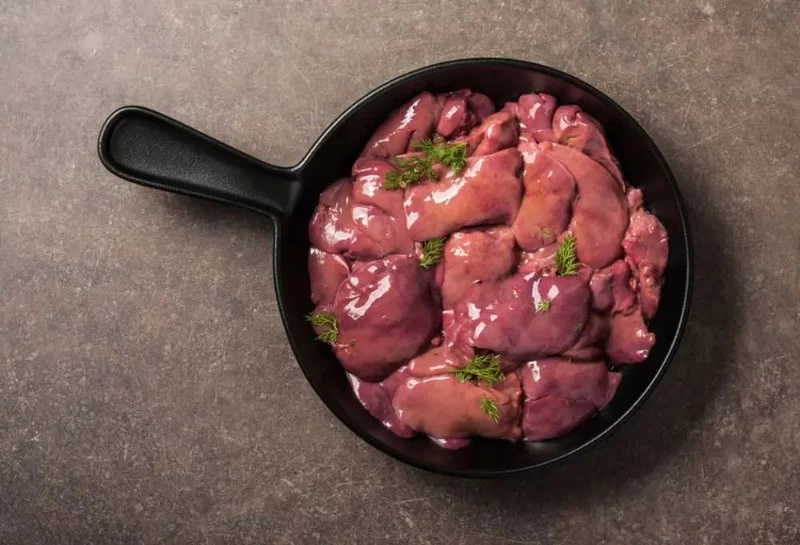- can-dogs-eat-chicken-livers-safely - Can Dogs Eat Chicken Livers Safely?
- nutritional-benefits-of-chicken-liver-for-dogs - Nutritional Benefits of Chicken Liver for Dogs
- how-to-prepare-chicken-liver-for-dogs - How to Prepare Chicken Liver for Dogs
- potential-risks-and-how-to-avoid-them - Potential Risks and How to Avoid Them
- real-examples-and-owner-experiences - Real Examples and Owner Experiences
- when-to-talk-to-your-vet-about-liver-in-the-diet - When to Talk to Your Vet About Liver in the Diet
Can Dogs Eat Chicken Livers Safely?
Yes, dogs can eat chicken livers—and in fact, they often love them! Chicken liver is not only safe for most dogs when fed in moderation, but it's also packed with essential nutrients. However, it’s important to understand both the benefits and the potential downsides of feeding this organ meat. Not every dog has the same nutritional needs or tolerances.
For many pet parents who prefer fresh, species-appropriate ingredients or even natural feeding methods, chicken liver can be a valuable part of a balanced diet. At Hidden Brook Veterinary, we often see pet owners asking about adding nutrient-dense options like liver to their dog’s meals—especially those exploring raw or homemade feeding plans.
Nutritional Benefits of Chicken Liver for Dogs
1. A Superfood for Canines
Chicken liver is considered a canine superfood. It's rich in vitamin A, iron, zinc, copper, phosphorus, and B vitamins, especially B12 and folate. These nutrients support vision, immunity, red blood cell production, and metabolism.
2. High-Quality Protein Source
Liver is also a protein powerhouse. It's low in fat compared to red meats and provides amino acids that are essential for muscle development, tissue repair, and energy.
3. Perfect for Picky or Underweight Dogs
Many dogs find liver irresistible. For underweight or recovering pets, it can stimulate appetite and help them regain energy and strength—though portion control remains important.
How to Prepare Chicken Liver for Dogs
1. Cooked vs. Raw Liver
Chicken liver can be served raw or cooked. Cooking it (lightly boiling or pan-searing without oil or seasoning) eliminates potential bacteria, making it safer, especially for senior dogs or dogs with sensitive immune systems.
2. Avoid Seasonings and Additives
Never feed liver that's been prepared with onions, garlic, salt, or other seasonings—these can be toxic to dogs. Simplicity is key when preparing liver at home.
3. Portion Recommendations
Veterinarians typically recommend liver not exceed 5% of your dog’s total weekly food intake. Too much liver, particularly vitamin A, can lead to hypervitaminosis A—a condition that may cause joint pain or deformities.
Potential Risks and How to Avoid Them
1. Vitamin A Toxicity
Because liver is so rich in vitamin A, overfeeding can be harmful. This is especially true in puppies, small breeds, or dogs already on a vitamin-rich diet.
2. Allergies or Digestive Upset
Some dogs may have a sensitivity to organ meats, resulting in diarrhea or vomiting. Start with a small amount and observe your pet’s reaction before making it a regular part of their meals.
3. Choosing the Right Liver
Source matters. Organic or pasture-raised chicken liver is the best option, as it's less likely to contain toxins or antibiotics. For trustworthy products, visit Hidden Brook Veterinary to find high-quality, pet-safe liver treats and supplements.
Real Examples and Owner Experiences
1. Balanced Feeding in Action
Tucker, a 3-year-old husky, struggled with low energy and poor coat condition. His owner began integrating a teaspoon of boiled chicken liver into his meals three times a week. Within two months, Tucker’s coat regained its shine, and he was more active and engaged.
2. A Warning from Overfeeding
On the other hand, Milo, a toy poodle, developed stiff joints and poor appetite after his owner unknowingly fed him liver daily. A visit to Hidden Brook Veterinary revealed vitamin A toxicity. With a detox protocol and dietary adjustments, Milo gradually recovered.
When to Talk to Your Vet About Liver in the Diet
1. For Puppies and Senior Dogs
Young puppies have different nutritional needs than adults, while senior dogs may have organ limitations. Your vet can help tailor liver inclusion to your dog’s life stage and activity level.
2. For Dogs with Chronic Conditions
Dogs with liver, kidney, or gastrointestinal issues may not tolerate organ meats well. Always consult a professional before introducing chicken liver if your pet has existing health conditions.
3. Personalized Feeding Plans
Every dog is different. Some may thrive on organ meat, while others might need it limited or avoided. At Hidden Brook Veterinary, we offer personalized nutrition plans that consider your pet’s health history, preferences, and lifestyle.












